Marie Javins's Blog, page 61
November 21, 2018
The (Improvised) Artsy Tour of Port-Au-Prince
Getting off a tiny private plane was a little different from getting off a commercial airliner in Port-Au-Prince. For one thing, I had to pay on arrival. I was taken by golf cart to a separate terminal from the main arrivals one, where a friendly missionary office worker ran my credit card and then ushered me out to the curb outside the terminal.
Another difference was only one taxi driver lackadaisically asked if I needed a ride. I’m sure things are different when an entire plane arrives, plus I was at the domestic terminal, but I was startled by how low-key my arrival was.
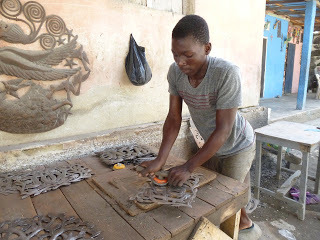
My driver, the one I’d confirmed just last night, was nowhere to be found. I sat down to wait. After a minute, I dug out my phone to text him.
No signal.
I spent the next five minutes wandering around, my phone held high to the sky. I was just about to beg an airline check-in desk for the password to their wifi connection when my cellular signal suddenly clicked in. I texted my driver. “I am coming,” he said. He was the same driver who’d taken me to the bus depot last Saturday, the last day Haiti had normal working hours.
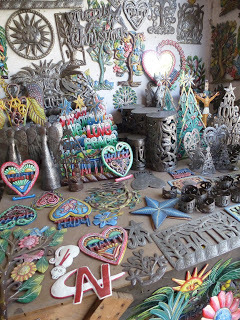 He had been confused about my arrival time, but he showed up within 20 minutes. Driving in PAP today was easy. The streets were still nearly deserted as a result of Haiti’s general strike.
He had been confused about my arrival time, but he showed up within 20 minutes. Driving in PAP today was easy. The streets were still nearly deserted as a result of Haiti’s general strike.
As we drove from the airport to La Lorraine Hotel in Petionville, the driver told me stories of his other clients. Everyone was stuck somewhere, sending him updates. He handed me his phone and asked me to text a tourist in Cap-Haitien about my private plane solution, so I gamely did so.
We quickly arrived in Petionville, though we had to pass a bad car accident on the way.
At La Lorraine, a different driver and guide were there waiting for me, their car full of touristy treats like a straw hat, a coconut, and a Haiti keychain. I'd booked two day tours with a travel agency, but obviously nothing had worked out, so we were improvising based on whatever was open. I wasn't even sure we had any business being out on the streets, but they didn't seem worried so I checked in, left my luggage, and raced down to their car. I cleared the sedan’s back seat of the souvenirs (What am I going to do with those?), hopped in, and off we went.
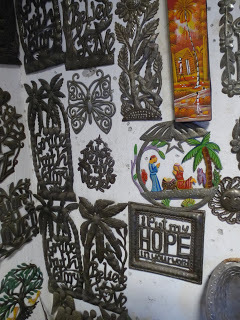 Our first stop was a bakery in Petionville. We then headed to Croix-de-Bouquets, hometown of Wyclef Jean, though that is not why we went there. We were going to Croix-de-Bouquets to see the small village of Noailles, where the entire town is dedicated to turning iron into artwork.
Our first stop was a bakery in Petionville. We then headed to Croix-de-Bouquets, hometown of Wyclef Jean, though that is not why we went there. We were going to Croix-de-Bouquets to see the small village of Noailles, where the entire town is dedicated to turning iron into artwork.
The outskirts of the town had ornate iron fencing—and so did everything else there. We stopped outside a u-shaped collection of small workshops, serenaded by the clank-clank-clank of hammers as artists worked their iron into shapes of animals, crosses, people, letters, trees, and aquatic creatures.
I wandered through all the workshops out of politeness—in truth, I could only carry so much, and there was just no way to get the giant pieces home, much as I wanted them on my wall.
The selling was easygoing, but I was the only tourist visiting at the moment, so I did become uncomfortable after a while. I felt guilty—I bought small pieces at three separate shops and then it was time to go. I knew I’d maxxed out on what I could reasonably carry.
We split and headed to a crafts cooperative on a dirt road, but it was closed. We drove back to town, pass ranks of motorcycle taxis, far more than usually would sit idle. A lot of Haitians were home, uncertain of what would come next in the protests.
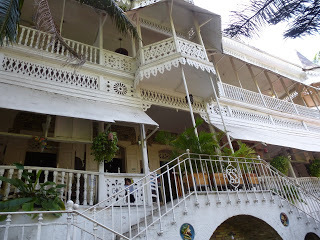 “Next, we will have lunch at a vodou hotel,” said the guide. What on earth did that mean, I wondered, as we drove back to the center of town.
“Next, we will have lunch at a vodou hotel,” said the guide. What on earth did that mean, I wondered, as we drove back to the center of town.
Oh, Hotel Oloffson. Graham Greene had placed The Comedians here. "Oh, The Comedians hotel," I said to my guide. He had no idea what I was talking about. He’s a lot younger than I am, and our cultural references are from different generations. To him, it's the "vodou hotel" because the owner is a vodou priest.
The vodou priest turned out to be Richard, a 60-year-old white man from Connecticut who studied anthropology at Princeton and used to go to Studio 54 back in its heyday. His initials are RAM, thus the band RAM, headlined by his Haitian wife, a great singer and dancer. They’d recently played at the opening reception of the Haitian art exhibit at Pioneerworks in Brooklyn, and I’d missed it.
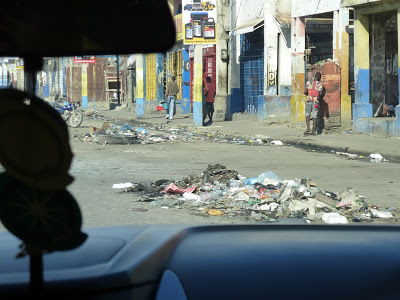 Richard had a droll sense of humor and we hit it off immediately. He showed me all over the property, walking me past the rooms named for the famous people who had stayed in them, and giving me the history of all the remarkable paintings in the lobby.
Richard had a droll sense of humor and we hit it off immediately. He showed me all over the property, walking me past the rooms named for the famous people who had stayed in them, and giving me the history of all the remarkable paintings in the lobby.
The guide and I had lunch and then headed to the car.
“That impromptu tour…” I said to the guide. “That doesn’t usually happen, does it?”
“Not at all. We were very lucky.”
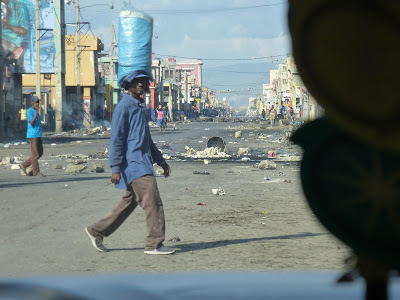
We headed downtown to Atis Rezistans—which is reputedly some of the most amazing art on the island, just a few blocks from the La Source bus dept (still closed up tight). But the streets were blocked with homemade roadblocks, some still smoldering. “We need to leave. Right now,” the driver said. He and the guide seemed slightly panicked, and I understood why. You never want to be the dumb tourists wandering around the front lines of a protest saying “Where is the art gallery? Does anyone know where the art gallery is?”
The guide was at a loss since everything he’d wanted to show me was closed. I asked him to take me to El Saieh Gallery, which I’d read about online. He’d never heard of it until I’d just asked Richard about it, so my guide resisted until finally he got sick of my requests and took us there.
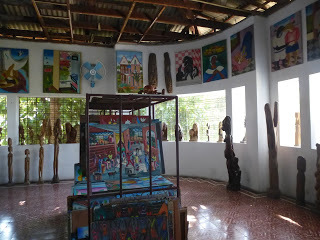 The guide and driver wouldn’t listen to my directions I got off Google Maps, and they asked bystanders until we found the gallery, up a steep hill at a dead end on a rough road.
The guide and driver wouldn’t listen to my directions I got off Google Maps, and they asked bystanders until we found the gallery, up a steep hill at a dead end on a rough road.
It was closed.
But we ran into the caretaker, who went in and asked the owner if we could visit. She let us in, and she too was friendly and chatty. I had a great conversation with her, like the one I’d had with Richard. Like the talks I’d had with George back in Jacmel. I was really enjoying how quickly I’d gotten my feet under me in Haiti, but I was sad I’d have to leave tomorrow.
El Saieh Gallery is a large hillside house full of incredible art. I bought some. I’d have bought more if I hadn’t had a guide walking around almost on top of me the whole time. I didn’t want to spend frivolous and shocking amounts of money in front of him.
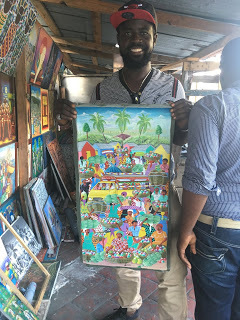
Good news, though. El Saieh does mail order.
We stopped at one last place on the way back to the hotel in Petionville, a street corner full of paintings. I picked up one last painting for $40. Could I have gotten it for less? Of course. People were desperate for cash as the banks were closed and all business had ceased for a week. But that’s not the point. Getting the best deal isn’t the point. A fair economic transaction is the point. That’s the kind of aid I believe in.
I tried to get the guide to take me to buy a vodou flag, but he and the driver were sick of me. They wanted to go home to their families and call it a day.
Next time, I thought.
But then in the morning, at the airport gift shop on my way to my flight, guess what I found?
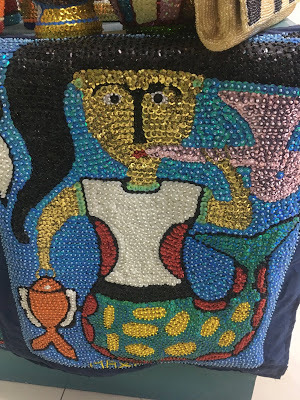
Another difference was only one taxi driver lackadaisically asked if I needed a ride. I’m sure things are different when an entire plane arrives, plus I was at the domestic terminal, but I was startled by how low-key my arrival was.

My driver, the one I’d confirmed just last night, was nowhere to be found. I sat down to wait. After a minute, I dug out my phone to text him.
No signal.
I spent the next five minutes wandering around, my phone held high to the sky. I was just about to beg an airline check-in desk for the password to their wifi connection when my cellular signal suddenly clicked in. I texted my driver. “I am coming,” he said. He was the same driver who’d taken me to the bus depot last Saturday, the last day Haiti had normal working hours.
 He had been confused about my arrival time, but he showed up within 20 minutes. Driving in PAP today was easy. The streets were still nearly deserted as a result of Haiti’s general strike.
He had been confused about my arrival time, but he showed up within 20 minutes. Driving in PAP today was easy. The streets were still nearly deserted as a result of Haiti’s general strike.As we drove from the airport to La Lorraine Hotel in Petionville, the driver told me stories of his other clients. Everyone was stuck somewhere, sending him updates. He handed me his phone and asked me to text a tourist in Cap-Haitien about my private plane solution, so I gamely did so.
We quickly arrived in Petionville, though we had to pass a bad car accident on the way.
At La Lorraine, a different driver and guide were there waiting for me, their car full of touristy treats like a straw hat, a coconut, and a Haiti keychain. I'd booked two day tours with a travel agency, but obviously nothing had worked out, so we were improvising based on whatever was open. I wasn't even sure we had any business being out on the streets, but they didn't seem worried so I checked in, left my luggage, and raced down to their car. I cleared the sedan’s back seat of the souvenirs (What am I going to do with those?), hopped in, and off we went.
 Our first stop was a bakery in Petionville. We then headed to Croix-de-Bouquets, hometown of Wyclef Jean, though that is not why we went there. We were going to Croix-de-Bouquets to see the small village of Noailles, where the entire town is dedicated to turning iron into artwork.
Our first stop was a bakery in Petionville. We then headed to Croix-de-Bouquets, hometown of Wyclef Jean, though that is not why we went there. We were going to Croix-de-Bouquets to see the small village of Noailles, where the entire town is dedicated to turning iron into artwork.The outskirts of the town had ornate iron fencing—and so did everything else there. We stopped outside a u-shaped collection of small workshops, serenaded by the clank-clank-clank of hammers as artists worked their iron into shapes of animals, crosses, people, letters, trees, and aquatic creatures.
I wandered through all the workshops out of politeness—in truth, I could only carry so much, and there was just no way to get the giant pieces home, much as I wanted them on my wall.
The selling was easygoing, but I was the only tourist visiting at the moment, so I did become uncomfortable after a while. I felt guilty—I bought small pieces at three separate shops and then it was time to go. I knew I’d maxxed out on what I could reasonably carry.
We split and headed to a crafts cooperative on a dirt road, but it was closed. We drove back to town, pass ranks of motorcycle taxis, far more than usually would sit idle. A lot of Haitians were home, uncertain of what would come next in the protests.
 “Next, we will have lunch at a vodou hotel,” said the guide. What on earth did that mean, I wondered, as we drove back to the center of town.
“Next, we will have lunch at a vodou hotel,” said the guide. What on earth did that mean, I wondered, as we drove back to the center of town. Oh, Hotel Oloffson. Graham Greene had placed The Comedians here. "Oh, The Comedians hotel," I said to my guide. He had no idea what I was talking about. He’s a lot younger than I am, and our cultural references are from different generations. To him, it's the "vodou hotel" because the owner is a vodou priest.
The vodou priest turned out to be Richard, a 60-year-old white man from Connecticut who studied anthropology at Princeton and used to go to Studio 54 back in its heyday. His initials are RAM, thus the band RAM, headlined by his Haitian wife, a great singer and dancer. They’d recently played at the opening reception of the Haitian art exhibit at Pioneerworks in Brooklyn, and I’d missed it.
 Richard had a droll sense of humor and we hit it off immediately. He showed me all over the property, walking me past the rooms named for the famous people who had stayed in them, and giving me the history of all the remarkable paintings in the lobby.
Richard had a droll sense of humor and we hit it off immediately. He showed me all over the property, walking me past the rooms named for the famous people who had stayed in them, and giving me the history of all the remarkable paintings in the lobby. The guide and I had lunch and then headed to the car.
“That impromptu tour…” I said to the guide. “That doesn’t usually happen, does it?”
“Not at all. We were very lucky.”

We headed downtown to Atis Rezistans—which is reputedly some of the most amazing art on the island, just a few blocks from the La Source bus dept (still closed up tight). But the streets were blocked with homemade roadblocks, some still smoldering. “We need to leave. Right now,” the driver said. He and the guide seemed slightly panicked, and I understood why. You never want to be the dumb tourists wandering around the front lines of a protest saying “Where is the art gallery? Does anyone know where the art gallery is?”
The guide was at a loss since everything he’d wanted to show me was closed. I asked him to take me to El Saieh Gallery, which I’d read about online. He’d never heard of it until I’d just asked Richard about it, so my guide resisted until finally he got sick of my requests and took us there.
 The guide and driver wouldn’t listen to my directions I got off Google Maps, and they asked bystanders until we found the gallery, up a steep hill at a dead end on a rough road.
The guide and driver wouldn’t listen to my directions I got off Google Maps, and they asked bystanders until we found the gallery, up a steep hill at a dead end on a rough road. It was closed.
But we ran into the caretaker, who went in and asked the owner if we could visit. She let us in, and she too was friendly and chatty. I had a great conversation with her, like the one I’d had with Richard. Like the talks I’d had with George back in Jacmel. I was really enjoying how quickly I’d gotten my feet under me in Haiti, but I was sad I’d have to leave tomorrow.
El Saieh Gallery is a large hillside house full of incredible art. I bought some. I’d have bought more if I hadn’t had a guide walking around almost on top of me the whole time. I didn’t want to spend frivolous and shocking amounts of money in front of him.

Good news, though. El Saieh does mail order.
We stopped at one last place on the way back to the hotel in Petionville, a street corner full of paintings. I picked up one last painting for $40. Could I have gotten it for less? Of course. People were desperate for cash as the banks were closed and all business had ceased for a week. But that’s not the point. Getting the best deal isn’t the point. A fair economic transaction is the point. That’s the kind of aid I believe in.
I tried to get the guide to take me to buy a vodou flag, but he and the driver were sick of me. They wanted to go home to their families and call it a day.
Next time, I thought.
But then in the morning, at the airport gift shop on my way to my flight, guess what I found?

Published on November 21, 2018 17:00
High Over Jacmel
Here's a look at Jacmel from the tiny plane that flew me from there to Port-Au-Prince.
And here are a few photos.
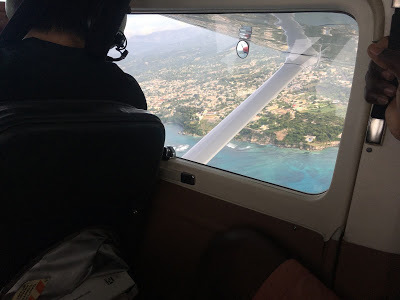
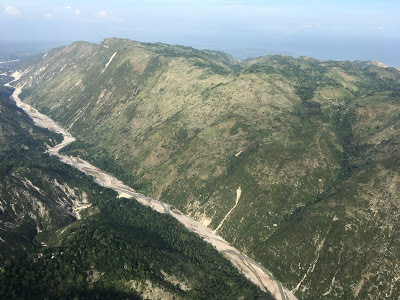
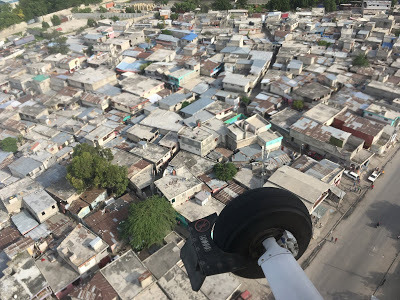 Arrival at Port-Au-Prince airport
Arrival at Port-Au-Prince airport
Published on November 21, 2018 07:20
A New High (or Low?)
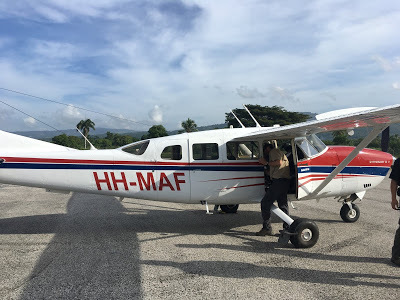 When I checked out of the hotel this morning, the clerk laughed and said "See you soon."
When I checked out of the hotel this morning, the clerk laughed and said "See you soon.""God, I hope not," I said. She was a nice clerk, but my thwarted attempts to leave Jacmel for Port-Au-Prince during a countrywide general strike had a Groundhog Day-like feel to them.
This was getting old.
I walked to the corner and hailed a moto-taxi using just a slight tip of my chin. I'd only been on a few motorcycle taxis in Haiti, but they work the same all over the world. I used to take one from town to my bungalow every night in Ubud for the month I stayed in Bali in 2011. And of course, I took them frequently in Kampala when I stayed there in 2005. And, you know, in other places too.
I was off to Jacmel's airport, just an airstrip and a building, really. The moto-taxi driver hand-signaled to get into the airport, so I paid the man 30 gourdes instead of 20 for his extra safety efforts. (He'd had to dodge a few smoldering tires where the protesters had been, so I probably should have tipped him more).
The pilot walked up to me at the airport security checkpoint. "You're Marie?" He was an earnest young American man, but what else would you be when you're a pilot for Mission Aviation Fellowship? We brought along one of their employees who had gone to Jacmel and become stuck there, just like me.
The six-seater held a pilot, a co-pilot, me, and the employee.
We took off, rising quickly over the sea and then turned back around to fly over the town.
Good-bye, Jacmel! You are lovely.
After days of trying to get over the mountain in a two-hour long bus ride, the $274 private plane journey took 15 minutes.
And came with spectacular views.
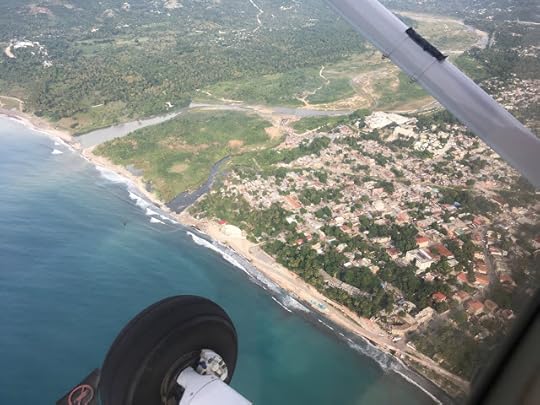
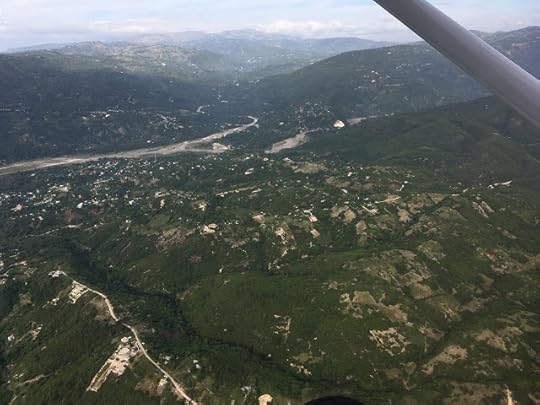
Published on November 21, 2018 06:20
November 20, 2018
Last Day in Jacmel
I packed, but I didn't bother taking my bag to the bus depot. I didn't even take them out of my room this time.
I walked up the street, away from the Jacmel historic district. The farther you walk from Rue du Commerce, the most typical the city looks, with rubbish on the roads and traffic and chickens and motorbikes. The walk up to La Source takes about ten minutes.
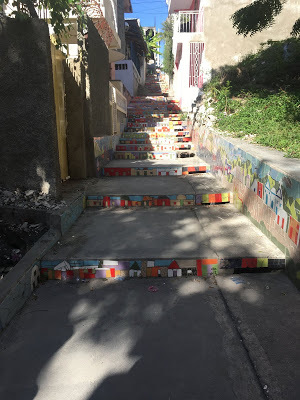 The depot gate was shut. I pushed it opened and barged in.
The depot gate was shut. I pushed it opened and barged in.
"Wout la bloké?" I asked.
"The road is still closed. We do not know when it will open again."
I wasn't surprised. I'd seen a lot of policemen at the staging area, in front of town headquarters. They had on what I can best describe as riot gear, and they'd go off north up the road in trucks. Were they going to the road block? To some kind of checkpoint? I don't know.
I walked back toward my hotel, and as I crossed the river, I was greeted.
"Hey, you are still here?"
The man greeting me had been one of the few with an open shop on Sunday during the initial protests. He was carrying a sack of groceries, but he adjusted them and shook my hand.
"Wout la bloké," I said ruefully. He laughed. I laughed. What else could was there?
"Good luck," he said, as I continued on my way.
I went up to my room and called Mission Aviation Fellowship. Yesterday, they'd been ready to fly over and get me, when I'd still thought $274 was too much for a flight. They were busy today and couldn't make it until tomorrow at 8:30 a.m. Did I want the flight?
"Do you take Visa?" Yes, they did. I booked the flight.
I then called Jacqui, a travel agent in PAP who knows everything. She could get me out for $400 (for a slightly larger plane). I thanked her and got a motorcycle taxi to the airport.
"Are there flights to Port-Au-Prince?" I asked the security guard.
"Yes, let me text the pilot."
He texted a private pilot, who said he could come get me right away for $274. That was the going rate, then.
"Does he take credit cards?"
Another text was sent. No, he did not.
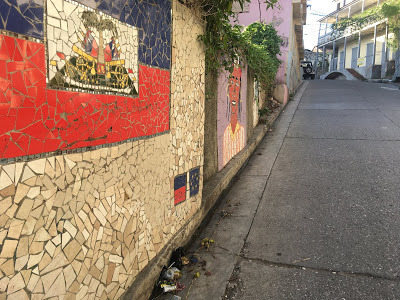 I had exactly $280 left. I could fly today, though I'd already called the hotel in PAP and pushed back my arrival another day. I'd already told the PAP travel agent I would not be there for today's Haitian food tour. What if the banks were closed when I arrived in PAP and I couldn't find a working ATM?
I had exactly $280 left. I could fly today, though I'd already called the hotel in PAP and pushed back my arrival another day. I'd already told the PAP travel agent I would not be there for today's Haitian food tour. What if the banks were closed when I arrived in PAP and I couldn't find a working ATM?
I decided to go tomorrow with the missionaries. Visa made all the difference.
I headed back to town, hungry by now. I'd eaten everywhere interesting and open downtown. So few places had opened their doors given the lack of customers. It was 86 degrees out and seventy gazillion percent humidity, and a guy who wanted to show me his art had attached himself to me, and I was planning to eat at Colin's Hotel, but then a protest headed down the block, right at me.
"Marie, you need to get inside."
Michel the guide was standing on the street, listening to a radio. He'd made me laugh earlier, when he'd told me the US would never win if it invaded Haiti "Because we have magic."
"I know, I know. It's time to go." I ducked into Florita, where all they had was spaghetti and a Coke. So that's what I ordered.
I started getting aches and pains shortly thereafter.
And in the "more things change, the more they stay the same" department...
No, I didn't end up with malaria. Or even a hot flash.
I got food poisoning.
Fortunely, it only lasted a single night.
I walked up the street, away from the Jacmel historic district. The farther you walk from Rue du Commerce, the most typical the city looks, with rubbish on the roads and traffic and chickens and motorbikes. The walk up to La Source takes about ten minutes.
 The depot gate was shut. I pushed it opened and barged in.
The depot gate was shut. I pushed it opened and barged in.
"Wout la bloké?" I asked.
"The road is still closed. We do not know when it will open again."
I wasn't surprised. I'd seen a lot of policemen at the staging area, in front of town headquarters. They had on what I can best describe as riot gear, and they'd go off north up the road in trucks. Were they going to the road block? To some kind of checkpoint? I don't know.
I walked back toward my hotel, and as I crossed the river, I was greeted.
"Hey, you are still here?"
The man greeting me had been one of the few with an open shop on Sunday during the initial protests. He was carrying a sack of groceries, but he adjusted them and shook my hand.
"Wout la bloké," I said ruefully. He laughed. I laughed. What else could was there?
"Good luck," he said, as I continued on my way.
I went up to my room and called Mission Aviation Fellowship. Yesterday, they'd been ready to fly over and get me, when I'd still thought $274 was too much for a flight. They were busy today and couldn't make it until tomorrow at 8:30 a.m. Did I want the flight?
"Do you take Visa?" Yes, they did. I booked the flight.
I then called Jacqui, a travel agent in PAP who knows everything. She could get me out for $400 (for a slightly larger plane). I thanked her and got a motorcycle taxi to the airport.
"Are there flights to Port-Au-Prince?" I asked the security guard.
"Yes, let me text the pilot."
He texted a private pilot, who said he could come get me right away for $274. That was the going rate, then.
"Does he take credit cards?"
Another text was sent. No, he did not.
 I had exactly $280 left. I could fly today, though I'd already called the hotel in PAP and pushed back my arrival another day. I'd already told the PAP travel agent I would not be there for today's Haitian food tour. What if the banks were closed when I arrived in PAP and I couldn't find a working ATM?
I had exactly $280 left. I could fly today, though I'd already called the hotel in PAP and pushed back my arrival another day. I'd already told the PAP travel agent I would not be there for today's Haitian food tour. What if the banks were closed when I arrived in PAP and I couldn't find a working ATM?I decided to go tomorrow with the missionaries. Visa made all the difference.
I headed back to town, hungry by now. I'd eaten everywhere interesting and open downtown. So few places had opened their doors given the lack of customers. It was 86 degrees out and seventy gazillion percent humidity, and a guy who wanted to show me his art had attached himself to me, and I was planning to eat at Colin's Hotel, but then a protest headed down the block, right at me.
"Marie, you need to get inside."
Michel the guide was standing on the street, listening to a radio. He'd made me laugh earlier, when he'd told me the US would never win if it invaded Haiti "Because we have magic."
"I know, I know. It's time to go." I ducked into Florita, where all they had was spaghetti and a Coke. So that's what I ordered.
I started getting aches and pains shortly thereafter.
And in the "more things change, the more they stay the same" department...
No, I didn't end up with malaria. Or even a hot flash.
I got food poisoning.
Fortunely, it only lasted a single night.
Published on November 20, 2018 18:00
November 19, 2018
A Visit to Church, in a way
"Don't eat anything! Don't let anyone touch you." The hotel manager's instructions stopped me. I looked at him, puzzled. I'd been reading in the guidebooks how vodou (not voodoo, which is something in New Orleans that mostly seems to involve souvenirs) is not about zombies and scary movies. It's a religion. Spiritualism.
The hotel manager laughed and laughed.
Oh. He was joking. Maybe? I mean, he's from Brooklyn, but before that, he was from Haiti. He knew vodou wasn't what we've seen in the movies.
I found the guide for the evening in front of the Florita, where he always is. He asked if I had money for rum—the donation to the vodou ceremony.
I was out of small money, but Haitian and US. I'd hoarded singles and fives for weeks before heading out from LA, but I'd used them all for tips and fees. I hadn't even had the opportunity to horde my Haitian small money—I used it up on motorcycle taxis and restaurant tips as soon as I got it.
I gave the guide a US twenty-dollar bill for taking me along with the other two tourists to the vodou ceremony, and I spent my last three singles on my part of the rum.
The Canadian tourist was driving, and Michel the guide was in the passenger seat. I was in the back seat with Michael from Brooklyn.
Michel guided us down dirt roads past an empty market, then instructed the Canadian to ford the river. We made it across without incident, then headed along more dirt roads until we got to a small village, where the guys went into a bar and purchased our rum-admission. We passed by women in bright red dresses walking to the ceremony. Finally, we pulled up in a field, and Michel led us along some dark paths into what looked like a corrugated metal barn.
Folding chairs were brought out for us and we were placed in the back of the room, where we waited for an hour as an emcee with a mic and MacBook deejayed for the crowd. Finally, the women in red started swaying as the drummers drummed, and a vodou priest took the mic and began to chant.
The women do not wear red every night of every ceremony. They wear the color of the spirit being honored—tonight they were honoring the criminal spirit.
We watched for two hours as the women danced, the audience danced, drummers drummed, the priest chanted, and everyone drank rum, beer, moonshine, whatever was offered.
I can't pretend to understand what the rituals were about, but I'm pretty sure I understand this.
Vodou is about community.
Published on November 19, 2018 22:27
Patron of the Arts
Back at the Jacmel Arts Center, the guy who had pulled me off the stairs at the request of the police wanted to show me his art.
I looked at every painting by every artist. Finally, I said "I will give you twenty dollars, and you choose the painting."
He immediately got to work, considering.
"Not by another artist. One of yours," I explained.
"I represent all the artists," he said.
"I know, but I want one of yours."
He chose one, wrapped it up, and sent me on my way.
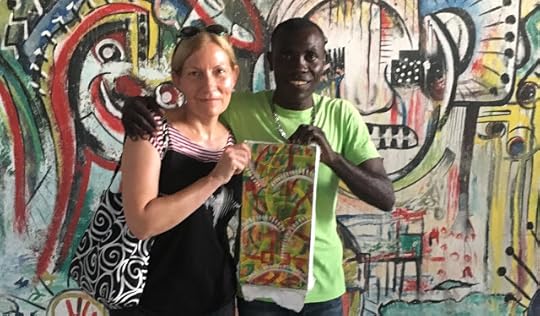
I looked at every painting by every artist. Finally, I said "I will give you twenty dollars, and you choose the painting."
He immediately got to work, considering.
"Not by another artist. One of yours," I explained.
"I represent all the artists," he said.
"I know, but I want one of yours."
He chose one, wrapped it up, and sent me on my way.

Published on November 19, 2018 16:00
Wout la Bloké
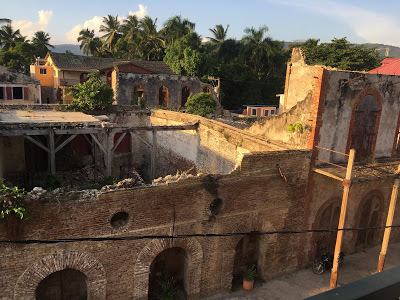 At 6, I hopped out of bed and turned on the shower. It takes a minute to warm up, so doing this involves consciously ignoring one's guilt about water shortages in Haiti, but I've definitely seen much worse. This only took a minute, maybe.
At 6, I hopped out of bed and turned on the shower. It takes a minute to warm up, so doing this involves consciously ignoring one's guilt about water shortages in Haiti, but I've definitely seen much worse. This only took a minute, maybe.I hurried downstairs five minutes before breakfast started, but it was taking too long. I watched as the staff showed up, and eventually my coffee did too. I nervously was watching the time. On my ride down, I'd just missed the previous bus (what can I say, I was on a plane), and I had to wait two hours for the next bus. And it's not the kind of place where you whip out the iPad and start reading. This is what books were made for, but I'm not carrying one here, only being abroad for a week.
After forever (more like 12 minutes), my breakfast was in front of me. I wolfed it down, ran upstairs for final preparations, shouldered my pack and my bag of souvenirs, handed my key to the young woman at reception, and headed out.
The walk to La Source bus depot (more a tiny lot the size of a small house) takes about ten minutes. It's nothing really, but feels longer when carrying luggage. Even when packing light.
"Taptap to Port-Au-Prince?" A man on the street tried to wave me down. "Non," I said. "La Source."
I kept walking.
When I got to La Source, the depot was sadly desolate. Two employees were there, but no passengers.
"No bus," said one. "Demain."
Oh crap. Yesterday's demonstrations in Port-Au-Prince meant the buses were not traveling today as a precaution.
"Taptap?" I asked.
The young woman at La Source explained to me as carefully as she could given our language difference, that I could go to the taptap station and see, but she did not think I would have any luck there either. She told me the ride to the taptap station was 20 gourdes. I had a 25 note in my pocket, so walked outside and flagged down a passing moto.
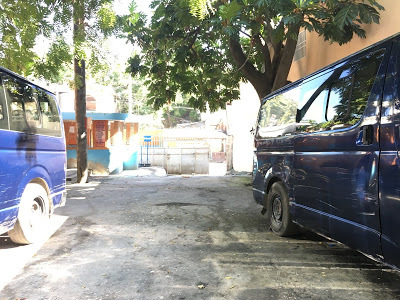 Off we zipped down the road for a few kilometers, finally pulling up to the taptaps.
Off we zipped down the road for a few kilometers, finally pulling up to the taptaps. It did not look good. There were several police officers standing around. That's never a good sign.
One of them explained to me that today there were no taptaps to Port-Au-Prince. It was forbidden.
I took the moto back to Rue du Commerce. Before I left, the policeman stopped us again.
He said something to the moto taxi driver, who adjusted how I was holding my bags. Oops. Sorry.
We zipped back to town. I got off the mototaxi and walked down the street. I ran into Michel, the guide who is eternally sitting in front of Hotel Florita.
He asked me all the questions I would have asked me if I had not already looked into it. Did I want to take a taptap instead? Did I know there was more than one place to catch a bus?
Yes, yes. I tried not to be exasperated.
"The only way," Michel said, "is to take a private car. It is $150."
"That's too much."
I called the private airline that goes around Haiti.
"No, we have no scheduled flights today." I am on their waiting list in case someone books one, but to fly just by myself, besides being outrageously wasteful, is $274. I'd do it in an emergency, but wanting to get to PAP in time to take a day tour with a focus on food was not an emergency.
Michel knew a private driver, so he gave me his number. Antoine did not speak English, so while I was able to explain to him in French what I needed, I could not understand his response. I gave up and took to texting him in Creole with the help of Google Translate.
"Li imposib," Antoine responded. "Eske ou Jakmel deja. Wout la bloké."
The road is blocked. Ah.
I walked to Tourist Information. They confirmed what everyone else had said. It's $150 set rate to take a private car, even for Haitians. "When I went to Canada, it was the same for me to take a car to the airport," said the tourism official.
But it doesn't really matter how much a private car is when the road is blocked, does it?
Then I got a Facebook Message from La Source. "We have a bus going now!"
I rushed back to La Source. It was still desolate.
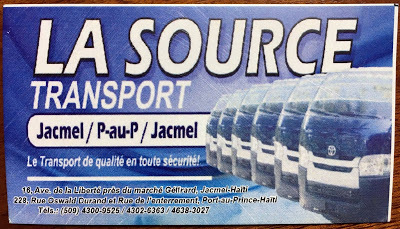
"Non," said the La Source employee. Exasperated, I sat down and refused to move. Finally, he called the owner who told me there were no buses today due to the roadblock. The message had been a mistake made by an uninformed employee.
I took my stuff back to the hotel, left it behind the desk, and went to sit outside the coffee shop until it opened.
It never opened. George, who owns the hotel I'm staying in, explained why to me later. Sometimes people did not open their businesses during protests, in case of vandalism.
I checked back into my room and started working. It's Monday in Burbank. Might as well get some work done while the wout was bloké.
Published on November 19, 2018 10:00
November 18, 2018
Lazy Sunday
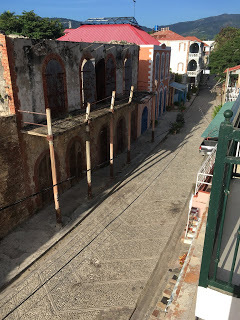 I sat eating breakfast inside the hotel's dining room, dimmed by the security doors which had not been pulled aside today, here on national strike day in Haiti. My Kindle app was full, but I didn't really want to sit inside all day. Still, there was no rush. It was Sunday morning, after all. Few businesses would be open.
I sat eating breakfast inside the hotel's dining room, dimmed by the security doors which had not been pulled aside today, here on national strike day in Haiti. My Kindle app was full, but I didn't really want to sit inside all day. Still, there was no rush. It was Sunday morning, after all. Few businesses would be open.I asked for milk with my coffee, and the server looked quizzically at me. "Um...lait?" I tried. She still didn't know what I meant. Finally, she said "Oh, let." And I assumed that's the pronunciation in Creole, but maybe I'm totally wrong.
"Haiti the beautiful asks for justice," said the Facebook posts of an artist I'd met the day before. She was ready to take to the streets. Everyone in town was either protesting or in lockdown in case of problems.
I peeked outside after a few hours. Some Haitians were venturing out. I saw a boy walk by with a radio to his ear. At first, I thought he was listening to the news, but then I realized a football game was happening.
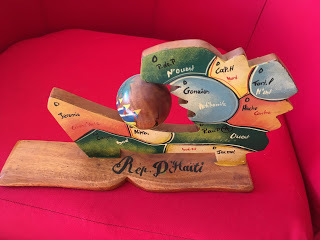 I headed downstairs to go outside for a walk, and as I passed the front desk, the hotel owner abruptly clicked off the TV before I could get a look at it. A guy in one of the few open art studios later explained why. “The reports are bad from Port Au Prince,” he said. “One person has died already.”
I headed downstairs to go outside for a walk, and as I passed the front desk, the hotel owner abruptly clicked off the TV before I could get a look at it. A guy in one of the few open art studios later explained why. “The reports are bad from Port Au Prince,” he said. “One person has died already.”I bought three little wooden figures from him for $6, because if someone bothered to open today, I figured they deserved at least a small sale. Then a guy in a park said "Oh, hey, I'll open my shop for you." I'd been in his shop yesterday, but I went along anyway. I bought this wooden Haiti sculpture with a world in its bay.
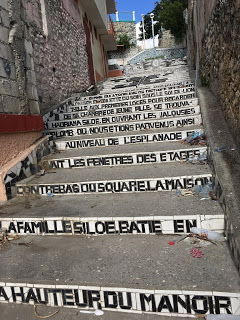 People in Jacmel were inquisitive and friendly. I was never at a loss for people to chat with. Some asked me which agency I worked for. Red Cross was a popular guess. They'd look pleased and surprised when I say I’m a tourist. Fun Marie fact—I was reputedly the first tourist into East Timor after the revolution. Actually, that's not really a fact. I don’t even believe it myself, but in 2001, some people told me this was true.
People in Jacmel were inquisitive and friendly. I was never at a loss for people to chat with. Some asked me which agency I worked for. Red Cross was a popular guess. They'd look pleased and surprised when I say I’m a tourist. Fun Marie fact—I was reputedly the first tourist into East Timor after the revolution. Actually, that's not really a fact. I don’t even believe it myself, but in 2001, some people told me this was true.As a tourist, I wanted to go take photos of the protests, but I understood my role was to stay out of the way, though Jacmel's protests were probably nothing like what was going on in Port-Au-Prince or even Cap-Haitien.
I stopped at Colin's Hotel for lunch, because it was 1) open and 2) had food. After I finished eating, I went to the cashier and asked "Where are these?" I showed her a photo of the Préfète Duffaut stairs. She said "Above Sogebank."
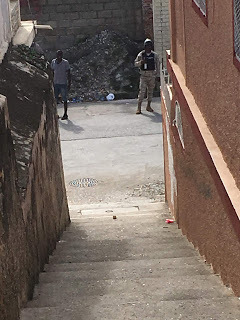 So off I went and there they were! Right where I turned into the stairs, two scooters collided and some guys started yelling at each other. But the police were there. OH WAIT, the police were there. I scurried up the stairs, hoping they wouldn't see me and send me back to the hotel.
So off I went and there they were! Right where I turned into the stairs, two scooters collided and some guys started yelling at each other. But the police were there. OH WAIT, the police were there. I scurried up the stairs, hoping they wouldn't see me and send me back to the hotel.A minute later, a guy I'd met yesterday at the art center came hurrying up after me.
"The police would like you to come back down. It is not safe here. Last time the protests happened, many people rushed down these stairs.”
Oh, okay.
I went back to the hotel for a while, then went for another walk. A few more shops had opened up, but not the one with the painting I liked. I wandered down to the sea, walked along the mosaic path at the ocean's edge. Crash! What was that?
I looked over to see a lamp post had toppled into the sea. Several Haitians gathered to fetch the parts of it back out. They stood there with the pieces of the lamp post, unsure what to do next.
Tomorrow, I thought, I will go to the bus around 7:30 in the morning and catch La Source back to Port-Au-Prince. I'd pre-booked a ride in PAP to get me from La Source to my hotel in Petion-ville, since I now had my hands full with my paper maché horse head and my chicken.
Au revoir, Jacmel!
Photos of my lazy Sunday are here.
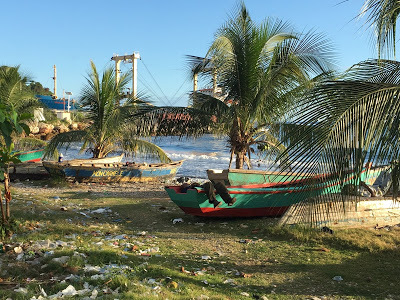
Published on November 18, 2018 18:28
November 17, 2018
Fierce
I'd visited several art stores on my whirlwind race around Jacmel, and now, as the end of the day approached, I left dance practice at the arts center and hurried back to see Charlotte and her paper maché horses.
I don't know how I knew that Charlotte was the one to stop and talk with. I saw her sitting in a park, working on a piece, and she was like a magnet. I realize that sounds ridiculous, but some people just have "it," whatever "it" is. I brush by a lot of people. Not this person. I stopped and greeted her. She showed me how she works.
I stopped to talk to her and took a few photos, then continued my town tour.
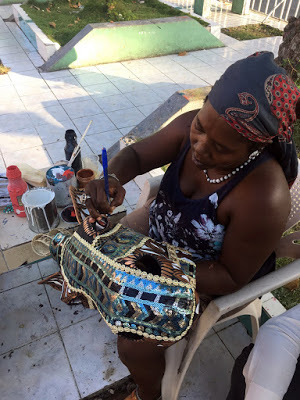
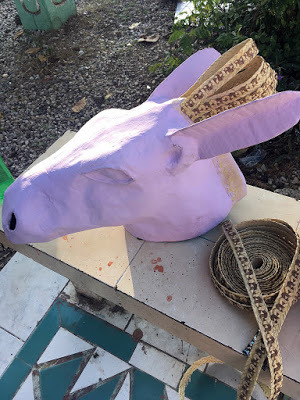
Now, as dusk approached, I hurried back to get a piece from her before she closed her shop. Tomorrow was protest day, so nothing would be open as everyone would either be out protesting or behind closed doors, and Monday morning, I was heading to Port-Au-Prince.
Charlotte was about to close up shop and head home, so I quickly chose a horse and a chicken. She spent several minutes polishing them both, taking pride in her work, and packing them carefully in paper packing materials. I hope they make them home.
A teen boy came by and lit her work with his phone light as she packed the sculptures. She told me how skeptical family had been of her career in the arts. She told me about managing a refugee camp after the 2010 earthquake. She was fierce, ready to take to the streets for the rights of others. Later, I'd learn she'd been the subject of documentaries and articles. She's a great spokesperson and tremendous advocate for rights of young people and women.
Here are some photos from my Saturday of traveling from Cap-Haitien to Jacmel.
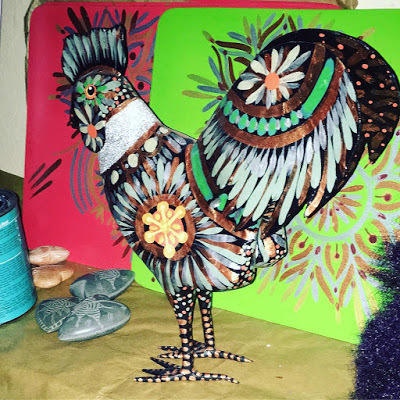
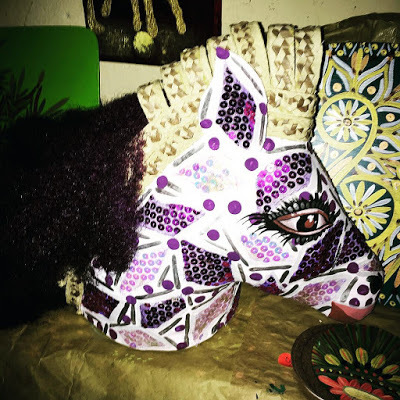
I don't know how I knew that Charlotte was the one to stop and talk with. I saw her sitting in a park, working on a piece, and she was like a magnet. I realize that sounds ridiculous, but some people just have "it," whatever "it" is. I brush by a lot of people. Not this person. I stopped and greeted her. She showed me how she works.
I stopped to talk to her and took a few photos, then continued my town tour.


Now, as dusk approached, I hurried back to get a piece from her before she closed her shop. Tomorrow was protest day, so nothing would be open as everyone would either be out protesting or behind closed doors, and Monday morning, I was heading to Port-Au-Prince.
Charlotte was about to close up shop and head home, so I quickly chose a horse and a chicken. She spent several minutes polishing them both, taking pride in her work, and packing them carefully in paper packing materials. I hope they make them home.
A teen boy came by and lit her work with his phone light as she packed the sculptures. She told me how skeptical family had been of her career in the arts. She told me about managing a refugee camp after the 2010 earthquake. She was fierce, ready to take to the streets for the rights of others. Later, I'd learn she'd been the subject of documentaries and articles. She's a great spokesperson and tremendous advocate for rights of young people and women.
Here are some photos from my Saturday of traveling from Cap-Haitien to Jacmel.


Published on November 17, 2018 19:04
Dance Practice
I gobbled down my lunch and raced off to see the town of Jacmel. Tomorrow Haitians were planning a general strike (initially, a travel agent had written to me that "riots are scheduled for November 18"), so I didn't think anything would be open. My late arrival meant I had about 3 hours to see the town before dark.
I'd studied my guidebooks and mapped out a quick route around Jacmel's historic center. My goal was to visit the art stores and workshops. I hit up several on one block, ran into Charlotte (a lovely and talented paper mache artist), then walked by the Jacmel Arts Center, where drumming came from the open upstairs windows. An artist pulled me in to upstairs and see this. Wonderful!
I'd studied my guidebooks and mapped out a quick route around Jacmel's historic center. My goal was to visit the art stores and workshops. I hit up several on one block, ran into Charlotte (a lovely and talented paper mache artist), then walked by the Jacmel Arts Center, where drumming came from the open upstairs windows. An artist pulled me in to upstairs and see this. Wonderful!
Published on November 17, 2018 16:16
Marie Javins's Blog
- Marie Javins's profile
- 9 followers
Marie Javins isn't a Goodreads Author
(yet),
but they
do have a blog,
so here are some recent posts imported from
their feed.



